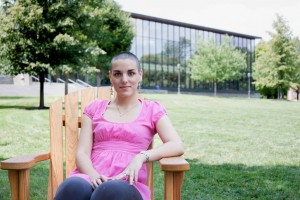
Ioana Marin '11
Neuroscience major Ioana Marin ’11 (Galati, Romania) has had her research accepted for presentation at the 2010 Society for Neuroscience annual conference in San Diego. With more than 40,000 members, the Society for Neuroscience is the world’s largest organization of scientists and physicians devoted to advancing understanding of the brain and nervous system.
Marin conducted research with Lisa Gabel, assistant professor of psychology. Gabel and Marin tested the role of a developmental dyslexia susceptibility gene (DCDC2) on learning and memory. They studied mice that had one or both copies of this gene and compared their maze-navigating performance against that of normal mice. Their research found that the mice do show impaired cognitive abilities.
Marin got the good news this summer while working with Lisa Schrott ’87 at Louisiana State University Health Sciences Center, conducting research on prenatal exposure to opiates. Their collaboration was sponsored by Lafayette Alumni Research Network, in which neuroscience majors collaborate with Lafayette alumni on cutting-edge research in the summer. Students receive a salary for 8 to 10 weeks of full-time work, and travel and housing expenses are covered.
During her sophomore year, Marin did independent research with Shyamal Majumdar, Kreider Professor Emeritus of Biology. Her project looked at a part of the molecular mechanism of action of Tamoxifen in breast cancer cells. During the fall of 2009, she studied abroad at University College London, which has one of the best neuroscience programs in Europe.
Marin’s work with Gabel involved everything from preparing the experiments to testing the mice and analyzing the data. She also spent time setting up new tracking software and creating tracking protocols. Testing was the most exhausting part of the project, she says. The work required her to spend about eight hours in the lab every day for two weeks.
“I definitely think that this research helped me,” she says. “I took every research opportunity since coming to Lafayette, and this [last] semester was particularly helpful because the research I did was behavioral, as opposed to molecular, which I had done my sophomore year. So it was a different experience and certainly a valuable one.”
Marin plans to pursue a Ph.D. in neuroscience after graduating next spring. “It’s hard for me to decide on a specific area though, just because so many things–pretty much everything–in this field fascinate me,” she says.
Marin adds that there are many things that she enjoys about her major. “The most important probably is that it feeds my curiosity and answers so many of my questions. I love to know how stuff works – how we work. Focusing on the brain really answered a lot of questions for me, at least partially or broadly. And it never ceases to fascinate me.”
She has also been involved with The Vagina Monologues, Concert Choir, and the International Students Association’s Extravaganza organizing committee. Off campus, she translates Technology Entertainment and Design conference talks to Romanian.
